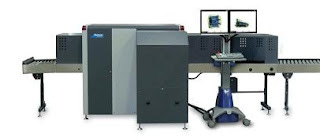Did Rapiscan fake privacy tests for airport scanners?

An influential member of Congress has suggested that Rapiscan, the company behind some of the full-body scanners used at American airports, faked tests of its machines' ability to protect passenger privacy. In a letter quoted by Bloomberg, Rep Mike Rogers (R-AL) charged that Rapiscan "may have attempted to defraud the government by knowingly manipulating an operational test."
The TSA uses two different types of full-body scanners in the nation's airports: backscatter machines and millimeter-wave machines. The former are manufactured by Rapiscan, and the TSA has spent $40 million on those machines to date.
Rogers chairs the House Transportation Security Subcommittee, and he held hearings Thursday to scrutinize the use of the machines.
Bloomberg says Rapiscan "has been trying, without success, to write software that would display a generic image" when a passenger is scanned by its machines. The TSA has been forced to put 91 of the machines, worth $14 million, in storage until Rapiscan gets its privacy software working properly.
Ironically, that move has improved the efficiency of TSA operations. According to USA Today, Rapiscan machines were taken out of service in New York, Chicago, Los Angeles, Boston, Charlotte, and Orlando. As a result, TSA representative John Sanders told Rogers's committee, the same number of lines can now process an additional 180,000 more passengers per day.
One reason traditional metal detectors are more efficient than body scanners is that privacy concerns forced the TSA to display the machines' output in a separate room. The agent in the separate room communicates with her colleague by radio if a passenger requires more scrutiny.
Rogers says he learned of the manipulation of the privacy tests from an anonymous source, but Rapiscan denies the charges. Sanders said the TSA didn't have any evidence to support the charges.
“At this point we don’t know what has occurred,” he told the committee. “We are in contact with the vendor. We are working with them to get to the bottom of it.”
The TSA is also under fire from the privacy group EPIC, which has sued to force the TSA to go through a traditional rulemaking process to justify the use of the full-body scanners. http://arstechnica.com/tech-policy/2012/11/rapiscan-accused-of-faking-privacy-tests-for-airport-scanners/
Rapiscan denies faking tests of body image scanners.
OSI Systems Inc. (OSIS)’s Rapiscan unit, one of two suppliers of body-scanning machines in U.S. airports, may have falsified tests of software intended to stop the machines from recording graphic images of travelers, a U.S. lawmaker said.
The company “may have attempted to defraud the government by knowingly manipulating an operational test,” Representative Mike Rogers, chairman of the House Transportation Security Subcommittee, said in a letter to Transportation Security Administration chief John Pistole Nov. 13. Rogers said his committee received a tip about the faked tests.
Rapiscan, in a statement today, said it couldn’t have manipulated testing because those processes were controlled by the government. “At no time did Rapiscan falsify test data or any information related to this technology or the test,” Peter Kant, an executive vice president with the company, said in an interview yesterday.
The Electronic Privacy Information Center sued the agency, calling use of the machines the equivalent of a “physically invasive strip search.”
Rapiscan has been trying, without success, to write software that would display a generic image. L-3 has been able to produce such software.
TSA has said passengers who don’t want to go through the scanners can opt for a pat-down instead. That option has also generated criticism from the public and members of Congress as being excessively invasive.
TSA relied on a third-party vendor rather than Rapiscan to verify the technology, so the agency may be attempting to find a scapegoat for a poorly managed program, Rogers said at a hearing today.
The Alabama Republican, who has oversight of TSA operations, said the agency first indicated it was moving Rapiscan machines to smaller airports, then couldn’t produce a list of airports. The agency is moving 91 units worth $14 million to a warehouse instead of redeploying them, Rogers said.
The TSA has 174 backscatter machines, David Castelveter, a TSA spokesman, said.
“It appears we not only have a technology problem, but a significant transparency problem on our hands,” Rogers said.
The TSA intends to keep the machines in a warehouse until the privacy-protection software works, John Sanders, assistant administrator for the agency’s office of security capabilities, said at the hearing.
http://www.bloomberg.com/news/2012-11-14/tsa-vendor-denies-faking-test-of-body-imaging-software.html


